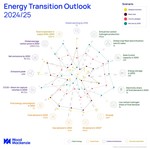News Release from windfair.net
Wind Industry Profile of
Forecast Capped: What Impact Will COVID-19 Have On Wind Industry?
The market analysts at Wood Mackenzie are revising their forecast for 2020: Compared to earlier predictions, wind projects with a capacity of 4.9 gigawatts will probably not be completed this year. This means that the total wind power expansion for 2020 is now expected to be 73 GW.
According to experts, the effects of the corona virus are of paramount importance for the globally active wind industry and represent a crisis the like of which the market has never seen before. Conditions are changing hourly as governments around the world influence the economy and politics to stop the virus. Industry stakeholders are forced to continuously adapt their business processes to balance worker safety with the needs of their customers, while at the same time adhering to the dynamic measures taken by governments to contain the pandemic.
Countries are likely to be affected to varying degrees. The biggest impact of the virus is expected in the U.S. and China - the two countries with the world's largest wind markets. However, Southern Europe, including Spain and Italy, is also currently in a stranglehold of measures such as shutdowns, which will disrupt supply chains. There have also been factory closures in these countries, although Vestas has reopened its factory in Spain after a few days. However, nobody can say for how long.

The world in the stranglehold of the virus (Image: Pixabay)
But not only the wind industry is affected by Corona: The oil industry is also suffering. Some traders are already talking about a slump of one fifth compared to the conventional figures. And this in an industry that has been struggling for some time anyway. Even if demand recovers to normal levels by mid-year, 2020 is still on the way to suffering the biggest drop in oil consumption since reliable records began in the mid-1960s, according to the trade journal WorldOil. "The oil industry is facing an unprecedented drop in demand as a result of the global measures against COVID-19. While it is too early to assess the impact properly, early indications by traders suggest a 20% drop in demand. In a sense, the current demand decrease is a preview of demand projections for 2030 and beyond. As an example, Barclays projects a global peak in oil demand between 2030 and 2035 followed by a steady demand reduction. We should watch how oil companies respond, as it will reveal vulnerabilities to decreasing demand and consistently low prices," said Arij van Berkel, director of Lux Research.
If renewable energy representatives have their way, this will not change in the future. Many see the current crisis as a unique opportunity to finally bring the world to grips with the climate crisis and to switch energy consumption definitively and comprehensively to renewable sources.
In Germany, for example, voices are now being raised demanding that the 40 billion euros to compensate for the recently agreed coal phase-out be linked to investments in renewable energies. "Now would also be the right time to talk again about the 40 billion euros that were planned for the phase-out of coal-fired power generation. At least the 4.35 billion euros in decommissioning premiums would now have to be converted into investment premiums. Under no circumstances must the money be channelled to shareholders and associates, but instead and in view of the current situation, must be made directly available for new investments. Instead of a gold-plated exit from old technologies, we expect a strong entry into decentralised energy networks," said the President of the German Renewable Energy Federation (BEE), Dr Simone Peter.
Tax breaks could also be used for direct investments in wind and solar power once the pandemic is over.
Greenpeace says: "If wisely chosen, the further economic stimulus packages can give the country a decisive boost in building a sustainable economy. Germany needs a new, green Marshall Plan. In addition to short-term measures, such as tax deferrals, short-time work compensation or transitional credits, which primarily secure the liquidity of companies and the population, ecologically steering, green economic stimulus packages are to be implemented in a second phase. In this way, social and economic damage caused by the corona crisis can be cushioned and necessary steps towards a climate-friendly economy can be financed.
- Author:
- Katrin Radtke
- Email:
- press@windfair.net
- Keywords:
- COVID-19, Corona, crisi, demand, renwable energy, wind, suffer, oil, coal, environment, preditction, Wood Mackenzie, USA, China, Germany, energy transition



























